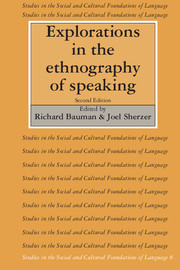Book contents
- Frontmatter
- Contents
- INTRODUCTION TO THE SECOND EDITION
- I PREFACE AND INTRODUCTION
- II COMMUNITIES AND RESOURCES FOR PERFORMANCE
- Introduction
- 1 A Quantitative Paradigm for the Study of Communicative Competence
- 2 Language Identity of the Colombian Vaupés Indians
- 3 ‘Our Ancestors Spoke in Pairs’: Rotinese Views of Language, Dialect, and Code
- III COMMUNITY GROUND RULES FOR PERFORMANCE
- IV SPEECH ACTS, EVENTS, AND SITUATIONS
- V THE SHAPING OF ARTISTIC STRUCTURES IN PERFORMANCE
- VI TOWARD AN ETHNOLOGY OF SPEAKING
- Notes
- References
- Index of names
Introduction
Published online by Cambridge University Press: 05 June 2012
- Frontmatter
- Contents
- INTRODUCTION TO THE SECOND EDITION
- I PREFACE AND INTRODUCTION
- II COMMUNITIES AND RESOURCES FOR PERFORMANCE
- Introduction
- 1 A Quantitative Paradigm for the Study of Communicative Competence
- 2 Language Identity of the Colombian Vaupés Indians
- 3 ‘Our Ancestors Spoke in Pairs’: Rotinese Views of Language, Dialect, and Code
- III COMMUNITY GROUND RULES FOR PERFORMANCE
- IV SPEECH ACTS, EVENTS, AND SITUATIONS
- V THE SHAPING OF ARTISTIC STRUCTURES IN PERFORMANCE
- VI TOWARD AN ETHNOLOGY OF SPEAKING
- Notes
- References
- Index of names
Summary
A basic element of an ethnography of speaking is the description of the speech community and its linguistic resources. Investigators are continually struck by the diversity of linguistic means in use in communities and the concomitant ability of members of the communities to communicate with one another nevertheless.
Every society makes available to its members a repertoire of linguistic alternatives or resources which they draw on (in an ecological sense) for both referential and stylistic purposes (see paper by Hymes in section VI). The nature of the communicatively meaningful contrasts within the ‘sociolinguistic’ repertoire varies dramatically from society to society. It might involve slight differences in the pronunciation of single sounds that must be described in terms of statistical tendencies. Thus Labov (1966) studies the social implications of the variable pronunciations of the sounds /th/, /dh/, and /r/, among others, in New York City. Gillian Sankoff here discusses the pronunication of the variable /l/ in Montreal French; speakers have available to them the choice of pronouncing this variable as either [l] or ø. This choice depends on both linguistic and social contexts of usage.
A society's linguistic resources might, on the other hand, consist of a complex of related dialects. Thus, James Fox shows that on the island of Roti, individuals speak the particular dialect of their nusak ‘native domain’ in everyday, colloquial speech, but draw on other Rotinese dialects for the formation of formal, ritual speech.
- Type
- Chapter
- Information
- Explorations in the Ethnography of Speaking , pp. 15 - 17Publisher: Cambridge University PressPrint publication year: 1989
- 1
- Cited by

